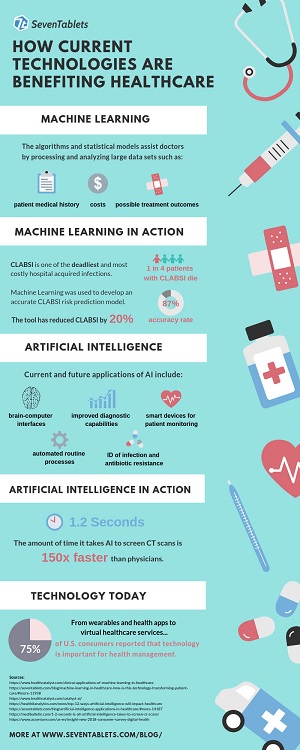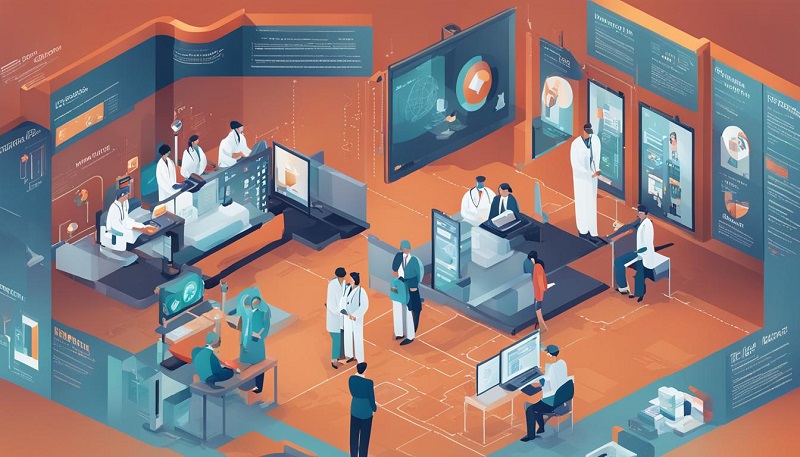
- The Role of AI in Healthcare
- Enhancing Diagnostics with AI
- AI-Enabled Precision Medicine
- AI for Remote Patient Monitoring
- AI-Driven Drug Development
- AI in Patient Engagement and Behavior Change
- Ethical and Regulatory Considerations in AI Adoption
- Challenges and Future Directions of AI in Healthcare
- Conclusion
- Write a comment
Artificial intelligence is revolutionizing the healthcare industry, bringing new possibilities for improved patient care and outcomes. From diagnosing diseases to personalized treatment plans, AI is changing the way healthcare is delivered. In this article we'll explore the potential of AI in healthcare and the benefits it brings to the digital health landscape. Prepare yourself to be amazed and at times a little perplexed.
Key Concepts:
- AI is transforming healthcare by improving diagnostics and enabling personalized treatment.
- AI-powered systems can automate administrative tasks and improve patient monitoring.
- AI algorithms can analyze medical images and assist in interpreting lab results.
- AI enables remote patient monitoring, leading to better outcomes and increased accessibility to quality healthcare.
- AI accelerates drug discovery and streamlines the development process for new therapies.
The Role of AI in Healthcare
Artificial intelligence (AI) is transforming the landscape of healthcare, playing a vital role in improving patient care and outcomes. In this section, we will explore the various ways in which AI is revolutionizing healthcare and the benefits it brings to the industry.
Enhanced Diagnostics and Treatment Planning
One of the key roles of AI in healthcare is its ability to analyze vast amounts of data and identify patterns and trends. This enables healthcare providers to make accurate diagnoses and develop personalized treatment plans. AI-powered systems can analyze medical images, such as X-rays and MRIs, with high accuracy, facilitating early detection of diseases and enabling prompt intervention. Additionally, AI algorithms can assist in the interpretation of lab results, flagging abnormalities and providing insights for further investigation. By leveraging AI in diagnostics, healthcare providers can improve the accuracy and speed of diagnoses, ultimately leading to better patient outcomes.
Automated Administrative Tasks
AI has also revolutionized administrative tasks in healthcare. With the help of AI-powered systems, healthcare professionals can automate repetitive administrative tasks, such as appointment scheduling and medical record management. This frees up valuable time for healthcare providers to focus on patient care and reduces the risk of human errors. By automating administrative tasks, healthcare organizations can enhance operational efficiency and improve overall patient experience.
Remote Healthcare Services and Patient Monitoring
AI has enabled the provision of remote healthcare services, ensuring accessibility to quality healthcare for patients, regardless of their location. With the help of AI algorithms and connected devices, healthcare providers can remotely monitor patients' vital signs and detect early signs of deterioration. This allows for timely interventions, preventing hospitalizations and improving patient outcomes. Remote patient monitoring powered by AI provides healthcare professionals with real-time patient data and actionable insights, enhancing the overall quality of care and patient satisfaction.
| Benefits | Description |
|---|---|
| Improved diagnostics and treatment planning | AI algorithms can analyze medical images and lab results to facilitate accurate diagnoses and personalized treatment plans. |
| Automated administrative tasks | AI can automate repetitive administrative tasks, freeing up healthcare professionals' time and improving operational efficiency. |
| Remote healthcare services and patient monitoring | AI enables remote patient monitoring, allowing for timely interventions and improved patient outcomes. |

Enhancing Diagnostics with AI
Artificial intelligence (AI) is revolutionizing the field of diagnostics, offering significant improvements in accuracy and speed. By leveraging AI algorithms, healthcare providers can analyze medical images such as X-rays and MRIs with high precision. This enables early detection of diseases and the development of personalized treatment plans. AI in diagnostics is transforming the way healthcare professionals make diagnoses, leading to better patient outcomes.

Improved Diagnosis with AI
AI algorithms excel in pattern recognition, allowing them to identify subtle abnormalities in medical images that may go unnoticed by human eyes. By flagging these abnormalities, AI can assist healthcare providers in identifying potential diseases and recommending appropriate treatment options. Furthermore, AI can analyze and interpret lab results, providing valuable insights for further investigation. This integration of AI in diagnostics helps to improve diagnostic accuracy, reduce human error and enhance patient care.
The use of AI in diagnostics also offers increased efficiency and productivity for healthcare professionals. With AI-powered systems, medical imaging can be processed faster, enabling healthcare providers to make timely and accurate diagnoses. This time-saving benefit allows healthcare professionals to focus on patient care and spend more quality time with their patients.
Overall, AI in diagnostics holds immense potential for improving healthcare outcomes. By harnessing the power of AI algorithms, healthcare providers can enhance diagnostic accuracy and efficiency, leading to better patient care and treatment outcomes.
| Benefits of AI in Diagnostics | Challenges of AI in Diagnostics |
|---|---|
| Improved accuracy in disease detection | Ensuring patient data privacy and confidentiality |
| Personalized treatment planning based on individual patient characteristics | Addressing algorithmic biases and ensuring fairness |
| Reduced human error in interpreting medical images and lab results | Continued training and validation of AI systems to ensure reliability |
| Faster processing time for medical imaging | Integration and compatibility with existing healthcare systems |
Table: Benefits and Challenges of AI in Diagnostics
As healthcare continues to embrace the power of AI, the future of diagnostics looks promising. Advancements in AI technology will further improve the accuracy of disease detection, leading to earlier interventions and improved patient outcomes. However, it is essential to address the challenges associated with AI adoption, such as data privacy and algorithmic biases, to ensure the responsible and ethical use of AI in diagnostics. With ongoing research and collaboration between healthcare professionals and technology experts, AI has the potential to revolutionize diagnostics and transform patient care.
AI-Enabled Precision Medicine
The field of precision medicine aims to deliver individually tailored treatments based on a patient's unique characteristics and genetic makeup. With the help of artificial intelligence (AI), healthcare providers can now leverage large datasets and advanced algorithms to identify specific biomarkers and treatment responses. This allows for the selection of the most effective treatment options, optimizing therapy outcomes and minimizing adverse effects.

AI algorithms can analyze genomic information and other relevant patient data to identify patterns and correlations that may not be apparent to human observers. By combining this wealth of information with clinical expertise, healthcare providers can develop personalized treatment plans that are tailored to the individual patient.
Through AI-enabled precision medicine, healthcare is moving away from a one-size-fits-all approach and towards a more targeted and effective way of delivering care. By considering individual differences in genetics, lifestyle, and health history, healthcare providers can optimize treatment outcomes, improve patient satisfaction and potentially reduce healthcare costs.
Who wouldn't enjoy lower costs without sacrificing quality?
The Role of AI in Precision Medicine
AI plays a crucial role in precision medicine by helping healthcare providers make sense of vast amounts of data and identifying patterns that may not be immediately apparent. However, it is important to note that AI is not meant to replace healthcare professionals, but rather to assist them in making more informed and precise decisions.
By embracing AI in precision medicine, healthcare providers can unlock the full potential of personalized treatment, bringing us one step closer to a future where each patient receives the care that is specifically tailored to their needs.
AI for Remote Patient Monitoring
Advancements in technology have enabled the integration of AI in remote patient monitoring, transforming the way healthcare is delivered. By leveraging connected devices and wearables, AI algorithms can collect and analyze real-time patient data, allowing healthcare providers to monitor their patients remotely. This continuous monitoring enables early detection of any changes in health parameters, allowing for timely interventions and preventing hospitalizations.
One of the key benefits of AI for remote patient monitoring is its ability to provide healthcare professionals with actionable insights. By analyzing the data collected from connected devices, AI algorithms can identify patterns and trends, alerting healthcare providers to any potential issues. This empowers healthcare professionals to intervene promptly and provide personalized care to their patients, leading to better patient outcomes.
Additionally, AI for remote patient monitoring enhances accessibility to quality healthcare. Patients can receive continuous monitoring and support from the comfort of their homes, reducing the need for frequent hospital visits. This is especially beneficial for individuals with chronic conditions or those who live in remote areas with limited access to healthcare facilities. AI-powered remote patient monitoring bridges the gap between patients and healthcare providers, ensuring that patients receive the care they need, regardless of their location.
Innovative Solutions for Connected Healthcare
With the integration of AI, connected healthcare has the potential to revolutionize healthcare delivery. AI-powered chatbots and virtual assistants can provide personalized recommendations, reminders, and support, helping patients manage their health and adhere to treatment plans. These innovative solutions enhance patient engagement and enable behavior change, empowering individuals to take an active role in their own health management.
The future of AI in remote patient monitoring holds immense potential. As technology continues to advance, we can expect further integration of AI with connected devices and wearables, providing even more accurate and real-time monitoring. The collaboration between healthcare professionals, technology experts, and researchers is essential in driving the adoption and successful implementation of AI for remote patient monitoring, ensuring better healthcare outcomes for patients around the globe.
| Benefits of AI for Remote Patient Monitoring | Challenges of AI for Remote Patient Monitoring |
|---|---|
| Early detection of health changes | Addressing data privacy concerns |
| Timely interventions to prevent hospitalizations | Managing algorithmic biases |
| Improved patient outcomes | Ongoing training and validation of AI systems |
| Enhanced accessibility to healthcare |
AI-Driven Drug Development
AI is transforming the drug development process by accelerating drug discovery and streamlining clinical trials. With the ability to analyze vast amounts of scientific literature and existing data, AI algorithms can identify potential drug candidates and predict their effectiveness with unprecedented speed and accuracy. This revolutionizes the traditional trial and error approach, making it possible to identify promising treatments faster and reduce the time and cost associated with drug development.

One of the key advantages of AI in drug development is its ability to analyze complex genomic information. By leveraging AI algorithms, researchers can identify specific biomarkers and treatment responses, helping healthcare providers select the most effective treatment options for individual patients based on their genetic profile. This personalized approach to precision medicine optimizes therapy outcomes and minimizes adverse effects.
Furthermore, AI can aid in the optimization of clinical trials. By analyzing large datasets and historical trial results, AI algorithms can identify potential patient populations that would benefit most from a particular treatment, helping to design more efficient and effective trials. Additionally, AI can help identify safety concerns earlier in the development process, enabling researchers to make informed decisions and prioritize patient safety.
Table: Advantages of AI in Drug Development
| Advantages | Description |
|---|---|
| Accelerated drug discovery | AI algorithms can analyze vast amounts of scientific literature and data to identify potential drug candidates faster. |
| Precision medicine | AI can analyze genomic information to identify specific biomarkers and treatment responses, enabling personalized treatment plans. |
| Optimized clinical trials | AI algorithms can analyze large datasets and historical trial results to design more efficient and effective trials. |
| Early safety identification | AI can help identify safety concerns earlier in the development process, prioritizing patient safety. |
AI in Patient Engagement and Behavior Change
AI-powered chatbots and virtual assistants are revolutionizing patient engagement and behavior change in healthcare. These intelligent tools provide personalized support, health-related information, and encouragement to help individuals adopt healthy habits, manage chronic conditions and adhere to treatment plans.

By leveraging AI algorithms, these chatbots and virtual assistants can offer tailored recommendations, reminders, and guidance based on an individual's unique needs and preferences. Whether it's reminding patients to take their medications, providing dietary suggestions, or offering mental health support, AI-powered tools can extend care beyond the clinical setting and empower patients to take an active role in managing their health.
One of the key advantages of AI in patient engagement is the ability to deliver continuous support and personalized interventions. These tools can collect and analyze real-time patient data, allowing healthcare providers to identify patterns and trends in behavior and health parameters. This enables timely interventions and proactive care, helping to prevent complications and improve overall health outcomes.
The Role of AI in Behavior Change
In addition to patient engagement, AI plays a crucial role in behavior change. By combining machine learning algorithms with behavioral science principles, AI-powered tools can understand and predict human behavior, enabling personalized interventions that effectively promote healthy habits.
AI algorithms can utilize data from patient interactions, such as chat logs and health tracking, to gain insights into individual behavior patterns. This information is then used to develop tailored strategies and interventions that are most likely to drive behavior change. Whether it's encouraging physical activity, supporting smoking cessation, or promoting medication adherence, AI can provide personalized nudges and support to help individuals make positive lifestyle choices.
Overall, AI in patient engagement and behavior change has the potential to enhance healthcare outcomes and empower individuals to take control of their health. By leveraging the power of AI algorithms and virtual assistants, healthcare providers can deliver personalized care, support behavior change and ultimately improve the well-being of patients.
Ethical and Regulatory Considerations in AI Adoption
As the use of artificial intelligence (AI) continues to expand in the healthcare industry, it is essential to address the ethical considerations and regulatory frameworks surrounding its adoption. With the potential to revolutionize patient care and outcomes, AI must be implemented responsibly to ensure patient safety and privacy.

One of the key ethical considerations in AI adoption is the need for transparent and explainable algorithms. Healthcare professionals and patients alike need to understand how AI systems make decisions and avoid biases that may affect patient care. This transparency helps build trust in AI technology and ensures that the decisions made are clinically sound and in the best interest of the patient.
Furthermore, regulations must be in place to govern the collection, storage and use of patient data. Protecting patient privacy and maintaining confidentiality are paramount in the healthcare industry. Robust regulations can help prevent data breaches and ensure that patient information is used appropriately and securely.
Table: Ethical and Regulatory Considerations in AI Adoption
| Ethical Considerations | AI Regulation |
|---|---|
| Transparency and explainability of AI algorithms | Clear guidelines on the use and implementation of AI in healthcare |
| Protection of patient privacy and confidentiality | Regulations governing the collection, storage and use of patient data |
| Addressing biases and ensuring fairness in AI systems | Regulatory frameworks to prevent algorithmic biases |
| Ethical use of AI in decision-making | Guidelines for the ethical implementation of AI in healthcare |
To foster responsible AI adoption in healthcare, it is crucial for healthcare organizations and policymakers to address these ethical considerations and establish robust regulatory frameworks. Collaboration between stakeholders, including healthcare professionals, researchers, and technology experts, is essential to develop guidelines and standards that promote the ethical use of AI while ensuring patient safety and privacy.
By embracing AI technologies with a strong ethical and regulatory foundation, the healthcare industry can harness the benefits of AI while maintaining the highest standards of patient care and protection.
Challenges and Future Directions of AI in Healthcare
While the use of artificial intelligence (AI) in healthcare holds immense promise, there are several challenges that need to be addressed for its successful implementation and adoption. These challenges include concerns regarding data privacy and security, algorithmic biases, and the need for ongoing training and validation of AI systems.
Data privacy is a critical concern when it comes to AI in healthcare. As AI algorithms rely heavily on patient data to make accurate predictions and recommendations, it is essential to establish robust safeguards to protect patient privacy and maintain confidentiality. Healthcare organizations and policymakers must establish clear regulations and guidelines to govern the collection, storage and use of patient data.
Another challenge is algorithmic bias, which refers to the potential for AI systems to produce biased results due to the inherent biases in the data used to train them. It is crucial to ensure that AI algorithms are fair, unbiased and do not discriminate against specific patient populations. Transparency and explainability of AI algorithms are essential to understand the decision-making process and identify and mitigate biases.
To overcome these challenges and shape the future of AI in healthcare, ongoing research and collaboration between healthcare professionals, researchers and technology experts are vital. Future directions of AI in healthcare include advancements in natural language processing, robotics and predictive analytics. These advancements have the potential to further enhance the capabilities of AI systems and improve patient care and outcomes.
The Future of AI in Healthcare
The future of AI in healthcare holds tremendous potential for transforming the way healthcare is delivered. Advancements in natural language processing will enable AI systems to understand and interpret unstructured medical data, such as physician notes and medical literature, with greater accuracy. This will enable healthcare providers to access valuable insights and knowledge more efficiently, leading to improved diagnosis and treatment decisions.
Robotics is another area where AI is expected to play a significant role in healthcare. AI-powered robots can assist in performing complex surgeries with higher precision and efficiency, reducing the risk of human error. These robots can also be used for tasks such as medication delivery, patient monitoring, and physical therapy, enhancing the overall quality of care.
Predictive analytics, powered by AI, can help healthcare organizations identify patterns, trends, and risk factors, enabling proactive intervention and preventive care. By analyzing vast amounts of patient data, AI algorithms can identify individuals at higher risk of developing certain diseases and recommend personalized interventions and lifestyle modifications to prevent or delay the onset of those conditions.
In conclusion, while there are challenges to overcome, the future of AI in healthcare is filled with possibilities. By addressing concerns surrounding data privacy, algorithmic bias and ongoing system validation, AI has the potential to revolutionize healthcare and improve patient outcomes. Through continued research and collaboration, AI will continue to evolve and advance, shaping the future of healthcare delivery.
Conclusion
AI has the potential to revolutionize healthcare, bringing a new era of digital health. By harnessing the power of AI, healthcare providers can enhance patient care, improve outcomes and address the challenges faced in the industry.

With AI's ability to analyze vast amounts of data, healthcare professionals can make accurate diagnoses and develop personalized treatment plans. This not only improves patient care but also optimizes therapy outcomes and minimizes adverse effects through precision medicine.
AI also plays a crucial role in remote patient monitoring, allowing healthcare providers to detect early signs of deterioration and intervene promptly. Additionally, AI-driven tools encourage patient engagement and behavior change, extending care beyond the clinical setting and empowering individuals to manage their health effectively.
However, ethical considerations and regulatory frameworks are vital to ensure responsible AI adoption. Transparent and explainable AI algorithms, alongside protective measures for patient data privacy, are required to maintain patient safety and privacy.
In conclusion, AI holds great promise in healthcare, but ongoing research, collaboration and responsible adoption are essential to fully realize its potential. By embracing AI, the healthcare industry can continue to evolve, delivering better patient care, improving outcomes, and creating a more connected and efficient digital health landscape.
Have you noticed ways artificial intelligence (AI) has changed healthcare?








